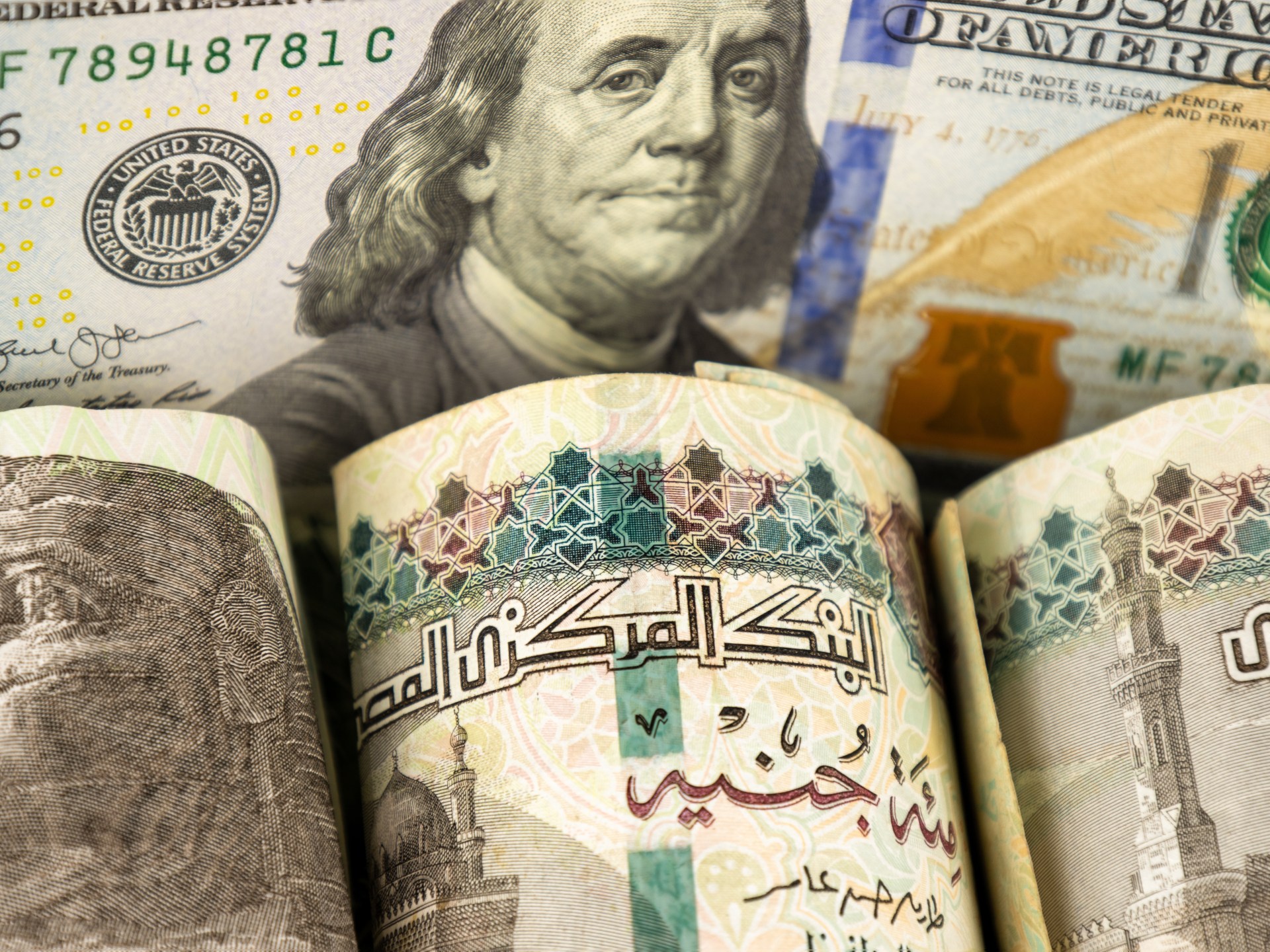The Egyptian pound has lost more than two-thirds of its value against the dollar (Shutterstock)
Egypt agreed with the International Monetary Fund - Wednesday - on an expanded support program worth $8 billion and let its currency decline sharply, and announced that it would allow the exchange rate to be determined according to market mechanisms, in an attempt to achieve economic stability.
Before this move, Egypt reached a $35 billion investment deal with the UAE to develop a peninsula on the Mediterranean coast and other projects, alleviating the long-standing foreign currency crisis, Reuters reported.
What is the cause of economic problems in Egypt?
Some of the reasons go back decades, such as faltering industrial development due to poor planning and bureaucracy, and export policies that left a persistent trade deficit.
The overvaluation of the currency and the dominance of the state and the army led to the reluctance of investors and the undermining of competition, as the Reuters report says.
The demand for borrowing during the era of Egyptian President Abdel Fattah El-Sisi caused the accumulation of foreign debt.
Foreign creditors have also become reluctant to invest, prompting the government to borrow locally despite the rise in interest rates, thus exacerbating the deficit.
All this, in addition to the growth of the money supply, led to a decline in the value of the currency and high inflation.
Foreign investment outside the oil and gas sector has become minimal.
Remittances decreased during 2022-2023 by 30% to $22 billion, with workers abroad reluctant to transfer at the official exchange rate.
Israel's war on the Gaza Strip, which borders Egypt's northeastern border, has weighed heavily on tourism and Suez Canal revenues.
Shipping lane revenues fell by about 50% earlier this year.
What is the state's position?
Sisi has repeatedly attributed the economic challenges facing Egypt to the turmoil of the 2011 revolution, as well as annual population growth, which the World Bank says was 1.7% in 2021.
Authorities also attribute the challenges to external shocks including the COVID-19 pandemic and the war in Ukraine.
The Egyptian pound fell to more than 50 against the dollar (Al Jazeera)
How bad have things gotten?
Over the past two years, severe dollar scarcity has put pressure on imports and caused a backlog of goods at ports, affecting the local industry.
The prices of many basic food items have risen much faster than the rate of inflation, which accelerated to an unprecedented level of 38% last September.
Economic growth has slowed, while many Egyptians complain of a decline in their standard of living.
The pound has fallen by more than two-thirds against the dollar since March 2022 during stages of devaluation, and pressure on the currency increased over the past year at a time when the exchange rate remained stable below 31 pounds to the dollar.
The country's external debt repayment schedule is burdening the country, while high interest rates and a weak currency have increased debt servicing costs.
Interest payments consumed more than 45% of total revenues in the fiscal year ending in June 2023.
Official data classified about 30% of the population as poor before the Corona pandemic, and analysts say the numbers have risen since then.
Estimates indicate that up to 60% of Egypt's 106 million citizens live below the poverty line or close to it.
Unemployment has fallen to about 7%, but participation in the labor market has also declined steadily in the decade ending in 2020. The public education sector is suffering from a state of deterioration, and many graduates are seeking work abroad.
Where did the money go?
In addition to normal expenses, Egypt spends huge sums of money on infrastructure, including housing projects, new cities, and the construction of highways.
The most prominent of these huge projects is the construction of a new capital at a cost of $58 billion in the desert to the east of Cairo.
Egypt's arms imports have also increased over the past decade, making it the third largest importer in the world, according to the Stockholm International Peace Research Institute.
Officials say they have boosted spending on social programs for those in need, including on a program to provide cash grants covering about 5 million families.
What is the government's plan?
Under the most recent agreement with the International Monetary Fund, the authorities are committed to exchange rate flexibility as well as fiscal discipline in order to reduce inflation and the trade deficit.
The plan that led to the agreement also includes structural reforms to encourage private sector growth, with policies including canceling exemptions and privileges for state-owned companies that have great influence.
The IMF said the agreement also provides “a new framework to slow infrastructure spending, including projects that have so far operated outside the scope of regular budget oversight.”
What support can Egypt build on?
Western and Gulf countries widely view Egypt under Sisi as a mainstay of security in a turbulent region.
Cairo received billions of dollars in deposits and investments from its allies in the Gulf after the shock caused by the Russian-Ukrainian war, and received new assurances of solidarity after the outbreak of the Gaza crisis.
But the Arab Gulf states are tightening their conditions for pumping new funds, and are increasingly looking for investments that will bring them a return.
Such investments and sales of state assets remained at modest levels until the agreement with the UAE on the Ras El Hekma Peninsula development project, which the International Monetary Fund says eases financing pressures
in the near term.
The agreement sparked speculation about more potential deals, including a plot of land near Sharm El-Sheikh in South Sinai.
Egypt also seeks to expand economic relations with countries including China and India, and hopes that its recent accession to the BRICS grouping will attract more investment flows.
Source: Reuters

